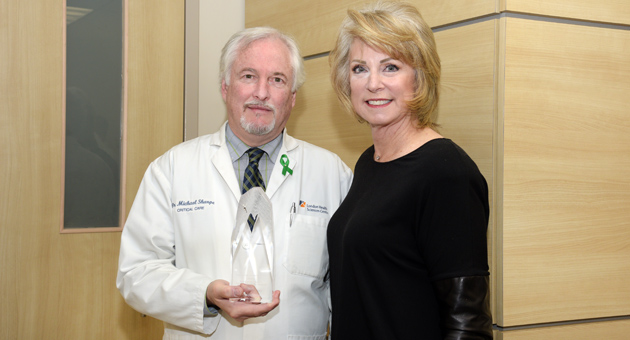Dr. Michael Sharpe
ProfessorBiography
Dr. Mike Sharpe completed medical school and fellowship in Anesthesia at Western University. He is currently a full-time Intensivist in Critical Care Medicine at the London Health Sciences Centre (LHSC) and Chair of the Organ Donation-Management Committee at the LHSC. He also leads the South West Local Health Integration Network (SW LHIN)’s Critical Care since its inception in 2006.
Dr. Sharpe is currently leading two SW LHIN pilot projects: the Life or Limb No Refusal Policy and the Adult Extramural Project. He has also made important contributions to SW LHIN's Regional and Hospital Patient Access and Flow Project.
From 2006 to 2008, Dr. Sharpe was a member of the Critical Strategic Planning and Advisory Committee for the Ministry of Health. Dr. Sharpe was a member of the Provincial Organ and Tissue Transplantation Wait Times Expert Panel (2009), followed by the Transplant Action Committee (2010) which implemented recommendations of the Organ/Tissue Transplantation Panel.

Dr. Michael Sharpe is presented a Lifetime Achievement Award from Ronnie Gavsie, President and CEO of Trillium Gift of Life Network (TGLN).
Current Research Interests
- Donation after cardiac death;
- Donation of tissue and organ donation;
- Effects of sepsis on microcirculation and Vitamin C administration during severe sepsis.
Awards and Honours
Lifetime Achievement Award, Trillium Gift of Life Network (TGLN)"The award is presented to a physician who is a strong advocate for organ and tissue donation both internal and external to the hospital, who mentors other hospital staff and physicians on the importance of organ donation and who has illustrated a dedication to advancing donation practices."
Read more about this prestigious award in LHSC news.
Recent Publications
-
2016
-
2015
-
2014
-
more
Secor D, Swarbreck S, Ellis CG, Sharpe MD, Feng Q, Tyml K. Ascorbate inhibits platelet-endothelial adhesion in an in-vitro model of sepsis via reduced endothelial surface P-selectin expression. Blood Coagul Fibrinolysis. 2016 Jan 29. [Epub ahead of print]
Bateman RM, Sharpe MD, Jagger JE, Ellis CG. Sepsis impairs microvascular autoregulation and delays capillary response within hypoxic capillaries. Crit Care. 2015 Nov 5;19(1):389.
Fraser GM, Sharpe MD, Goldman D, Ellis CG. Impact of incremental perfusion loss on oxygen transport in a capillary network mathematical model. Microcirculation. 2015 Jul;22(5):348-59.
Sharpe MD, Jeffreys C, Martin C, Barrett M, Priestap F, Pierce M, Kojlak J. Extramural pilot project: designated on-call intensivist in tertiary care centre improves access to critical care consultation/referral and resources. Healthc Q. 2015 Jul;18(2):46-9.
Swarbreck SB, Secor D, Ellis CG, Sharpe MD, Wilson JX, Tyml K. Effect of ascorbate on plasminogen activator inhibitor-1 expression and release from platelets and endothelial cells in an in-vitro model of sepsis. Blood Coagul Fibrinolysis. 2015 Feb 27. [Epub ahead of print]
Almikhlafi M, Sharpe MD. Care of the organ donor [Chapter 37]. p. 442-450. In: Fuller J, Granton J, McConachie I, editors. Handbook of ICU Therapy, 3rd Ed. United Kingdom: Cambridge University Press; c2015.
Swarbreck S, Secor D, Li F, Gross PL, Ellis CG, Sharpe MD, Wilson JX, Tyml K. Effect of ascorbate on fibrinolytic factors in septic mouse skeletal muscle. Blood Coagul Fibrinolysis. 2014 Oct;25(7):745-53.
Tanner AE, Särkelä MO, Virtanen J, Viertiö-Oja HE, Sharpe MD, Norton L, Davies-Schinkel C, Young GB. Application of subhairline EEG montage in intensive care unit: comparison with full montage. J Clin Neurophysiol. 2014 Jun;31(3):181-6.
Swarbreck SB, Secor D, Ellis CG, Sharpe MD, Wilson JX, Tyml K. Short-term effect of ascorbate on bacterial content, plasminogen activator inhibitor-1, and myeloperoxidase in septic mice. J Surg Res. 2014 Apr 13. pii: S0022-4804(14)00375-8. [Epub ahead of print].
Sharpe MD, Van Rassel B, Haddara W. Oral and intravenous thyroxine (T4) achieve comparable serum levels for hormonal resuscitation protocol in organ donors: a randomized, double-blinded study. Can J Anesth. 2013 Oct;60(10):998-1002.
Secor D, Swarbreck S, Ellis CG, Sharpe MD, Tyml K. Ascorbate reduces mouse platelet aggregation and surface P-selectin expression in an ex vivo model of sepsis. Microcirculation. 2013 Aug;20(6):502-10.
Karvellas CJ, Lescot T, Goldberg P, Sharpe MD, Ronco JJ, Renner EL, Vahidy H, Poonja Z, Chaudhury P, Kneteman NM, Selzner M, Cook EF, Bagshaw SM; Canadian Liver Failure Study Group. Liver transplantation in the critically ill: a multicenter Canadian retrospective cohort study. Crit Care. 2013 Feb 9;17(1):R28.
Moser M, Sharpe MD, Weernink C, Brown H, House AA, Luke PP. Five-year experience with transplantation of Donation after Cardiac Death (DCD) kidneys in a Canadian transplant program: factors affecting outcomes. Can Urol Assoc J. 2012 Dec;6(6):448-52.
Young GB, Sharpe MD. Donation after cardiac death: enter the neurologist. Lancet Neurol. 2012 May;11(5):385-6.
Norton L, Hutchison RM, Young GB, Lee DH, Sharpe MD, Mirsattari SM. Disruptions of functional connectivity in the default mode network of comatose patients. Neurology. 2012 Jan 17;78(3):175-81.
Secor D, Li F, Ellis CG, Sharpe MD, Gross PL, Wilson JX, Tyml K. Impaired microvascular perfusion in sepsis requires activated coagulation and P-selectin-mediated adhesion in capillaries. Intensive Care Med. 2010 Nov;36(11):1928-34.








